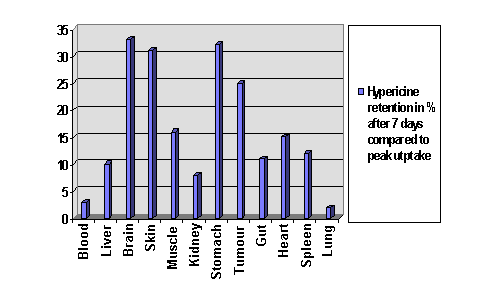
Figure 14. Hypericin retention in % of maximum uptake after 7 days in different murine organs.
Study 12
Hypericin uptake in rabbits and nude mice transplanted with human squamous cell carcinomas: Study of a new sensitizer for laser phototherapy
AU: Chung-PS; Saxton-RE; Paiva-MB; Rhee-CK; Soudant-J; Mathey-A; Foote-C; Castro-DJ
AD: Department of Otolaryngology-Head and Neck Surgery, Dankook University, College of Medicine,
Cheonan, Korea.
SO: Laryngoscope. 1994 Dec; 104(12): 1471-6
Description
Tissue uptake and biodistribution of hypericin were measured in rabbits and in mice xenografted with P3 human squamous cell carcinoma to assess the value of this dye as an in vivo sensitizer for laser photoactivation of solid tumors. Rabbits were examined after 4 and 24 hours; mice were examined after 2, 4, 6, 8, and 24 hours and after 3 and 7 days for dye uptake in different organ systems.
Results

Figure 14. Hypericin retention in % of maximum uptake after 7 days in different murine organs.
Comments
Does hypericine pass the blood-brain-barrier?
One of the unclear issues has been whether hypericum passes the blood-brain-barrier (BBB).
Thiele et al. have postulated that hypericin does not pass the BBB, and thus must have its primary site of action outside of the CNS. This study clearly contradicts this. It is demonstrated that hypericin passes over to the brain in mice and rabbits, but in very small concentrations. The concentration in brain tissue is only 20 ng/ml four hours after intravenous injection of hypericin in a dose of 1 mg. The blood concentration was at maximum 400 ng/ml.
The concentration in spleen and lungs was 500-700 ng/ml.
Accumulation of hypericin in brain tissue
The really interesting fact is that the elimination of hypericin in brain tissue (and skin and stomachorgans where hypericine is supposed to have good effect)seems to be extremely slow. The exact half-life of hypericin in brain tissue was not clearly determined, but the diagrams suggest that it might be several weeks! Is this the reason why hypericum has such a slow, steadily increasing effect on depression? It seems likely that the brain concentration of hypericin will continue to rise for a long time until it reaches a steady state. This needs to be further investigated in animal experiments.
Hypericum sales in Germany unknown in America
The authors conclude that hypericin also has an antidepressant effect, but state that it is no longer used as in antidepressive treatment. At the same time the study was done, hypericum had 30% of the German antidepressant market.
Copyright © 1996 by Harold H. Bloomfield, M.D. and Peter McWilliams
Disclaimer - Copyright - Contact
Online: buildfreedom.org | terrorcrat.com / terroristbureaucrat.com